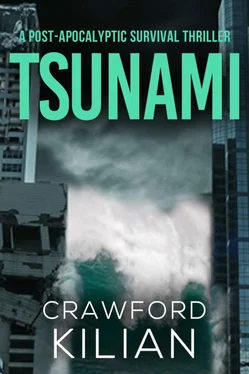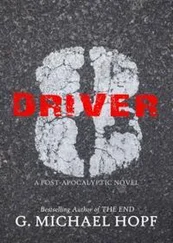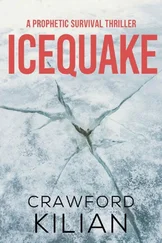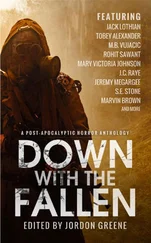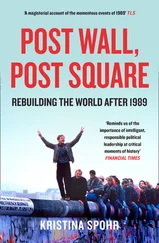“Oh jeez, oh shit, man, my arm — hey, easy, we’re not doin’ anythin’, honest, shit, my arm. Please.”
Kirstie walked quickly to the doorway, keeping the light on the young man’s face. “Shut up!” Her voice sounded shrill in her own ears, but he obeyed. “Sam, you’d better search him.”
“He’s got a knife.”
“What about his friend?”
“A gun,” said Einar. “He dropped it. I kicked it into the room.”
“Good, got it,” Sam said. “What the hell did you do to him?”
“I threw the padlock.”
Kirstie stepped closer to Einar’s prisoner. “I take it you two were looking for drugs.”
“Uh, well, yeah. So?”
She fought down an urge to kick him. “Sam, give me the gun.” She studied it for a moment: a snub-nosed revolver, finished in dull blue. It sat in her hand, heavy and ugly. She turned the flashlight back on the young man, who looked terrified.
“Now listen to me. You and your friend are going to help us get this stuff to where it’s needed. If you try anything, I’ll shoot you. Do you believe me?”
“Yeah, yeah, Christ.”
“All right, then. Sam, get the other one up.”
They filled their backpacks and then emptied the plastic bags in the wastebaskets to use as sacks. Leaving the room, Kirstie locked it. The five of them went to the storeroom at the rear of the building, and found big boxes of gauze and bandages. When everyone was carrying as much as possible, they went back out the side door.
The grey afternoon was dimming into dusk. The two would-be looters looked small and almost pathetic, skinny men with long wet hair and sodden denim jackets.
“Right,” said Kirstie. “Let’s get back to the school.”
“Hey, lady,” said the unhurt one, “you gonna walk up the street with a gun on us?”
“Yes.”
“Thass ki’nappeen,” the other one mumbled. Fresh blood oozed from his split lips.
“And if I shoot you, it’ll be murder. Get going.”
With their arms full, Sam and Einar and their prisoners made slow progress. The streets were deserted now. The fires were spreading, and a sullen orange glow shimmered over everything. The noise of burning was loud. Smoke was thin at times, then thick, as gusts of wind blew in from the bay.
Kirstie looked over her shoulder and saw an enormous cloud, black laced with orange, blotting out the western sky. Its base blazed hot yellow, and it seemed to extend far to the northwest. What could be burning like that, out on the water? A ship?
She was stepping on a fallen telephone pole when a growing rumble from behind made her pause. Before she could turn, the pole heaved beneath her feet and toppled her backward into black, stinking water. It washed over her, carrying slimy lumps of debris.
Gasping, Kirstie fought her way back onto her feet. The water was receding already, but the four men were clambering onto cars. She waded towards them.
“Come on, come on!” she shouted. “It’s not much of a wave, then, is it? Let’s go.”
Sheepishly, the men slid down into the water. A storefront crashed noisily into the street, exposing a show room crowded with refrigerators and ranges. One of the looters staggered and cried out.
“Jeez, I just stepped on a dead body!”
“Go on!” Kirstie shouted.
It was full dark by the time they reached the school. With lights glowing in its windows, it looked warm and welcoming in the black-and-orange night. An ambulance parked nearby flashed red and blue, and the plastic shelters in the schoolyard reflected the colours.
“About time,” grunted the medical student when they met him in the hallway. “I thought you weren’t coming back. Thanks.” He looked curiously at the gun. “What’s that for?”
“Persuasion.”
“Huh.”
“Doc — can you do so’thin’ for my’outh?” asked the injured looter.
The medical student looked dispassionately at him. “Wait your turn.”
Kirstie handed the pistol to Sam, who delicately unloaded it before stuffing it in a pocket of his windbreaker.
“Look,” said the medical student, “you’re soaking wet and you look bushed, but can I ask you and your friends for one more favour?”
“Sure,” Kirstie nodded.
“We got over fifty people too hurt to be moved, even if we had someplace to move ‘em to, okay? And we got maybe a hundred other injured and three hundred with nowhere to go, most of ‘em relatives of the casualties. We got to start feeding these people.”
“You want us to scavenge food for five hundred people?” Kirstie said, slowly and incredulously.
“Grab everyone you can find to lend a hand. Try the Co-op supermarket or wherever, okay?”
Kirstie sagged against a wall. “Oh God.”
A few minutes later, she and Sam and Einar and fourteen other people were walking through the darkened streets. Candles burned in a few houses, but most looked deserted. From one pitch-black house, though, music blared; shadowy figures stood on the front porch, smoking dope and giggling. In a dark back yard, a dog howled.
Above the housetops to the west, fire pulsed under orange-and-black clouds of smoke. Fine soot stung their eyes and tasted bitter.
Kirstie, Sam and Einar led the others up several blocks to the Co-op. It was a big building, part of a chain of consumer-owned supermarkets in the Bay Area. They were surprised to see its beige facade was glaringly illuminated by floodlights from a big white van parked near the entrance. Across the sides of the van was written: KSRA ACTION NEWS — All the News for Sacramento!
A reporter stood on the sidewalk, with a cameraman and sound girl behind him, and a cluster of uniformed National Guardsmen between him and the entrance to the market. The reporter was interviewing their commanding officer, a young lieutenant who looked self-conscious. Standing around the van were dozens of civilians, most of them shouting angrily.
“I realize it seems unfair,” the lieutenant was saying to the reporter, “but our mission here is to protect property. It’s other people’s job to look after persons in distress. I’m sorry if that disappoints some of these individuals, but that’s our job.”
Kirstie shouldered past a guardsman and tapped the lieutenant on the arm, ignoring the news crew.
“Lieutenant, I must insist that you allow us into the market.” He gaped at her, startled as much by her Scottish-schoolmistress accent as by her boldness. “I have to feed five hundred homeless and injured people.”
The young officer’s girlish mouth set hard. “I have my orders, ma’am, and those orders are to prevent looting. The Office of Emergency Services will be in action here as soon as possible, and that means your people will be looked after. Now would you please move on.”
“I will not move on.”
He turned and walked stiffly away; Kirstie would have followed him, but the reporter turned his attention to her. He was a boyish, curly-haired man in baggy jeans, a leather coat and rimless glasses.
“You say you’re trying to feed five hundred people? Where are they? What kind of shape are they in?”
She hesitated, imagining the effect of TV cameras and inane questions on the people in the schoolyard. They’d gone through enough without having to entertain viewers sitting comfortably in undamaged homes far away.
“Many of them are badly hurt, even dying,” she said at last.
The reporter put down his microphone, and his cameraman stopped taping. “My name’s Jason Schwartz, KSRA News. Could we see these people? Maybe interview some of them?”
“I don’t think that would do much good, Mr. Schwartz. — No, wait a moment. If you’ll help us, you can interview anyone you like.”
“How?”
“Take us somewhere, where there’s food. A market, a warehouse — I don’t care. And help us bring the food back in your truck.”
Читать дальше
